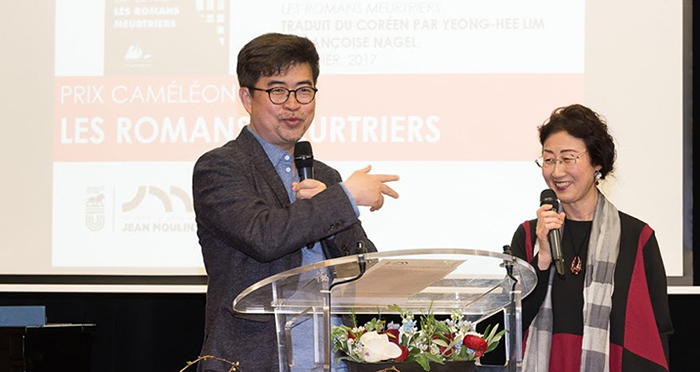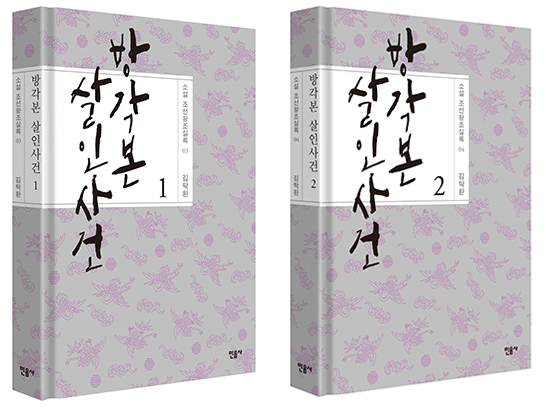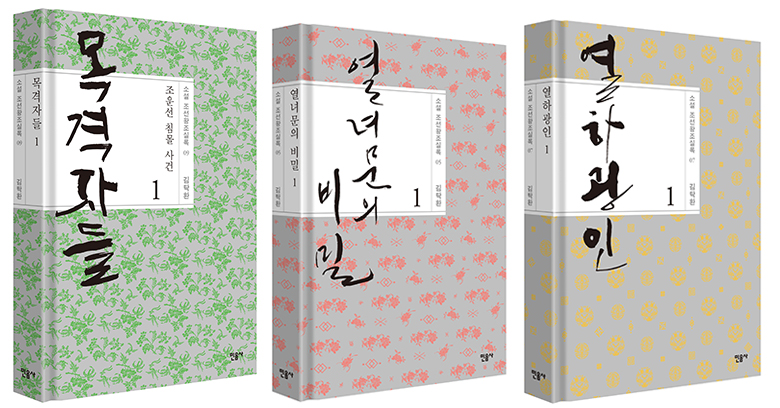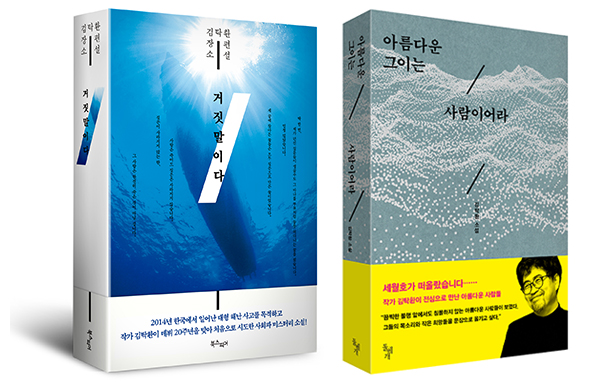|
Interview with author Kim Tak-hwan
2018.05.30
Recently, Korean author Kim Tak-hwan's the banggakbon murder case was given a literary prize from France's distinguished Jean Moulin Lyon 3 University. Renowned for his mystery novels, Kim's convincing story structure won over judges and as a result, he has been seen in a new light for his talent and ability. Many of his 25 novels have been turned into movies and television dramas. As an author, he has a wide spectrum, even going on to produce books addressing social issues like It is a lie and He who is beautiful will be a person
KPIPA We are pleased to introduce you to our readers. Could you please say hello to our readers and tell us about yourself?
Kim Tak-hwan(Kim below) I officially became a writer in 1996 and I am currently a full-time author specializing in full length novels. I've published 25 novels so far and my interest mostly dwells on issues that have taken place long ago. My novels have been a number of different genres including mystery, romance and thriller. Several of my novels have been adapted into television dramas and movies. Some of these would be the 104-episode “The Immortal Yi Sun-sin”, the 24-episode “Hwang Jini” and films “Detective K: Secret of the Virtuous Widow”, “The Magician” and “Gabi”.
△ With translator Lim Young-hee while during acceptance speech for Chameleon literary award
KPIPA We heard your The Banggakbon Murder Case was awarded the Chameleon literary award from France's Jean Moulin Lyon 3 University. What do you think was the reason behind the novel's performance?
Kim The Banggakbon Murder Case is the first in my Baektabpa series that I began in 2003. After that novel, I released The Secret of the Virtuous Widow(2005), Yeolhagwangin(2007) and The Witnesses(2015). The Baektabpa series is formed of novels centered on a group of academics in the late 18th century who dream of a modernized society. This group goes out and solves crimes. Although French readers' understanding of the Joseon Dynasty might be limited, I don't think they had a difficult time understanding mystery because it's such a broad subject. The Banggakbon Murder Case is set in a time when the publication of books was being shifted from handwriting to printed form. It focuses on the new changes within the novelist community as well as among publishers and readers. I think there are many things in common between East and West when it comes to the transformation of novels that came with the development of printing technology. That's most likely why French readers found it easy to understand the novel.
KPIPA In addition to The Banggakbon Murder Case, you've written many interesting novels that take place in the Joseon Dynasty. Where do you get your ideas?
Kim I don't really go out and look for story ideas. Rather, I try to ask myself the most important question in my life at that time. I write my novels in order to ponder this question over a thousand times over the course of at least three years. I search for the best time, location and people to put that question into the form of a story and I research, write and edit. I think the more the question delves into mankind's essence the broader the tension and emotional impact in the story become. This leaps beyond any limitations that time or space might present. Even though I write about people or cases that took place more than a century ago, my questions are always aimed at myself or my readers who are living in the present.
KPIPA Your novel It is A Lie that was given the 33rd Yosan Kim Jeong-han literary award and He Who is Beautiful Will Be A Person published last year dealt with the sinking of the Sewol ferry. What role do you think novelists should play when these kinds of social events occur?
Kim After I published those two novels, I had many asking me whether it was strange to write about current events after writing historic novels for so long. It wasn't strange at all. It's because I place my questions in the center and write to find the answers to those questions. It is A Lie and He Who is Beautiful Will Be A Person already had the Sewol sinking as the time and place for the questions at hand. I did organize my novels with the concept 'beauty' but my question for those novels was "How does man withstand and overcome terrible misfortunes?" As I sought out the answer for that question, I came to understand the wounds of the victims and noticed the people who came together to seek the truth of that day. I think they are the reason despair will turn to hope and that dark will never win against light.
KPIPA Do you have any novels you'd like to introduce to readers outside South Korea?
Kim I'd like for them to get to know my historic and social novels. My historic novels would be the ones in the Baektabpa series I mentioned and my novels that take place in the late 19th century. Both East and West experienced the transitional period from the middle ages to modern capitalism so readers will be able to read these books easily drawing from their own experiences. My romance novel Russian Coffee which tells the tale of coffee first introduced to the Korean peninsula; A Court Lady from Joseon in Paris, a love story between a Joseon court lady and a French diplomat; Bank, a novel on the first bank and listed company in Korea; and Opium War, a noir novel on mafia groups in Joseon, China and Japan fighting over opium centered on Incheon.
My novels on society would be It Is A Lie and He Who is Beautiful Will Be A Person. It Is A Lie deals with the civilian divers who were involved in the search and rescue process after the Sewol ferry sank and how they later suffered from health complications while being ignored by the government.
KPIPA If there are any new novels you're working on, or plans for the future please tell us about them.
Kim I've been writing a full-length novel for over three years now over the question, "What does it mean to 'be good'?" There have been many, many novels worldwide on the evil of mankind or evil beings, but few on the goodness of mankind or kind people in general. I am planning to feature a kind, fun and charismatic character never before shown in Korean novels. I am also writing another novel on society and this will address the value of life and urge the government to take responsibility.
Organized by Gwon Ji-hye
|
Pre Megazine
-

Review of Seoul International Book Fair 2017
VOL.1
2017.06 -

Visiting Book Fair Thailand 2017
VOL.1
2017.06 -

Translated and Published in Taiwan, Meet Chin-Myong Kim's THAAD
VOL.1
2017.06 -

Independent Publishing
VOL.2
2017.07 -

A Korean Publisher Growing With the World
VOL.2
2017.07 -

Gilbut Children
VOL.2
2017.07 -

Character Licensing Fair 2017
VOL.2
2017.07 -

The Online and Digital Marketing of South Korea's Publishing Industry
VOL.3
2017.08 -

Golden Bough
VOL.3
2017.08 -

Black Forest
VOL.3
2017.08 -

2017 Korea Book Fair in Vietnam
VOL.3
2017.08 -

Ji-hyeon Lee's Pool
VOL.3
2017.08 -

Characteristics of South Korean Web Novel Platforms and Ventures Overseas
VOL.4
2017.09 -

Publishing Educational Materials for 40 Years “Darakwon”
VOL.4
2017.09 -

Leading the Popularization of Art “Art Books”
VOL.4
2017.09 -

South Korea to Participate in 2017 International Istanbul Book Fair as Guest of Honor
VOL.4
2017.09 -

Haemin Sunim's The Things You Can See Only When You Slow Down
VOL.4
2017.09 -

The Present and Future of South Korea's "Screensellers"
VOL.5
2017.10 -

Humanist Books
VOL.5
2017.10 -

Dolbegae
VOL.5
2017.10 -

The 2017 Guadalajara International Book Fair
VOL.5
2017.10 -

Interview with You-jeong Jeong
VOL.5
2017.10 -

South Korea's Translated Literature Awards, Where Are They Now?
VOL.6
2017.11 -

UU Press
VOL.6
2017.11 -

Risu·Reading Cat Publishing Company
VOL.6
2017.11 -

Asian Publishers Fellowship Program in Seoul 2017
VOL.6
2017.11 -

Interview with author Soon-won Lee
VOL.6
2017.11 -

10 Keywords: South Korea's publishing industry in 2017 at a glance
VOL.7
2017.12 -

"NexusBOOKS"
VOL.7
2017.12 -

"SangSang Publications"
VOL.7
2017.12 -

2017 Bookstore Day
VOL.7
2017.12 -

Interview with Mi-kyoung Song
VOL.7
2017.12 -

Trends and news in South Korea's book design
VOL.8
2018.01 -

Agencies talk actual copyright export cases
VOL.8
2018.01 -

Daewon CI
VOL.8
2018.01 -

K-Books Blossoming in Central America
VOL.8
2018.01 -

Interview with author Jung-hyuk Kim
VOL.8
2018.01 -

Book Factory Dubulu
VOL.9
2018.05 -

Yaong Seoga
VOL.9
2018.05 -

Where Books and People Become Closer
VOL.9
2018.05 -

Interview with author Kim Tak-hwan
VOL.9
2018.05 -

Book Ecosystem Vision Forum - the 3rd
VOL.10
2018.06 -

The Birth of Publishing Company ‘BookGoodCome’
VOL.10
2018.06 -

Diverse Ways to Love Books
VOL.10
2018.06 -

Ha Seong-Ran, An Author Ready to Talk
VOL.11
2018.07 -

2018 Seoul International Book Fair ‘New Definition’
VOL.11
2018.07 -

GOZKNOCK ENT
VOL.11
2018.07 -

South Korea’s Literary Awards
VOL.11
2018.07











